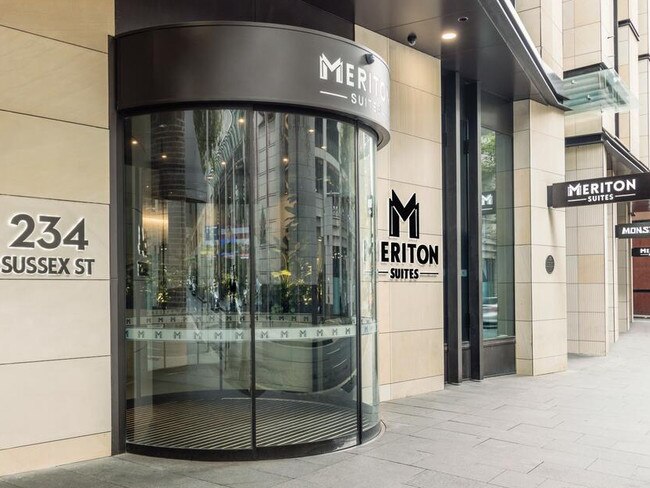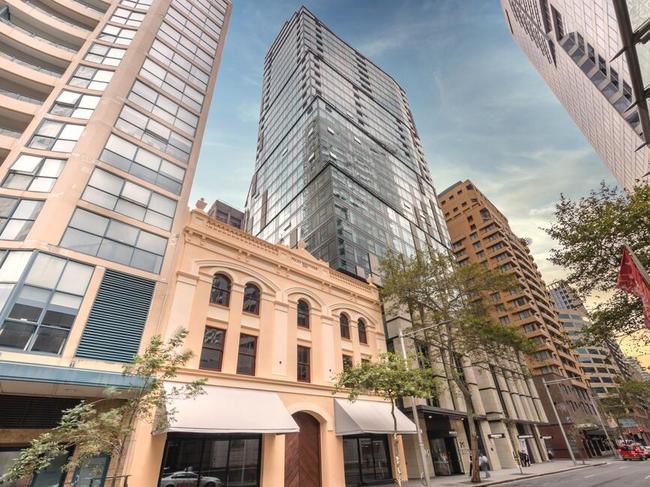Australians in quarantine at Sydney’s Meriton on Sussex fear air systems could spread COVID
The smell of cigarette smoke being “pumped” into a Sydney couple’s hotel room has sparked COVID contamination fears and backlash.
Coronavirus
Don't miss out on the headlines from Coronavirus. Followed categories will be added to My News.
Frightened Australians in hotel lockdown say their rooms are being contaminated by their neighbour’s potentially coronavirus-infected air.
A young father described smelling cigarette smoke being “pumped” into the Sydney hotel room where he has spent the past eight days and said he feared his family and others in the hotel could be exposed to COVID-sick quarantiners.
On his eighth day in quarantine in Sydney’s Meriton on Sussex, the father said he and his Australian wife had headaches from the pervasive smell of smoke and a perfume-like odour.
But their main concern was that if the smell of smoke could travel into their room then so could virus particulates.
When they complained to management and police running the quarantine site he said he was told that all rooms on his hotel floor were sharing recirculated air.
“It was my understanding that each room was isolated but after talking with management they told me that the whole floor is connected,” said the father on a social media post.
“It was confirmed that someone was smoking but my concern is greater than the smoke since we’re all being quarantined for a particular reason.”

His wife said the experience had been “distressing” and that the couple had been dealing with the smoke for the past two days.
“We don’t understand why this is still going on,” she told News Corp Australia.
“I just want the respect that every Australian citizen is owed. If you can’t guarantee my safety then let me get out of here and try something different.”
The persistent smoke was a “concern”, said Robyn Schofield from Melbourne University’s School of Earth Sciences.
Assistant Professor Schofield said it was possible that smoke smells could pass through the HPAA filters of quarantine hotels, but that if they were using the charcoal filters that are considered best practice it shouldn’t happen.
“I really hope that there has been the ventilation that is necessary for the quarantine facility to understand its air flows and what’s going on,” she said.
“We’re in the middle of a pandemic and we know that there is airborne transmission and we’ve got a variant of concern and an it’s infectious from the air and … spread through ventilation.”
The family posted their concerns on a closed Facebook page for Australians in hotel quarantine and received a stream of concerned replies.
“If the smoke can get to you so can any virus floating around,” said one.

“I have avoided COVID overseas for so long and then to catch it in Australia … I am very concerned,” said another.
The father said that when he first complained about the smell of smoke, he was told the air on his floor was recirculated.
“We turned off the central air, which is heating and airconditioning, and what we’re noticing is that the main smell is coming in through the laundry and the bathroom,” he said.
“We just had cigaret (sic) smoke just pumping into our laundry and bathroom. So it just filled up our whole little apartment here.”
He said the smoke was irritating but the family’s main concern was the potential for infection.
“The only way it was brought to my attention that somehow rooms are connected with air ventilation was the smell of smoke,” he said.
“It does draw the concern that I’m in quarantine to be able to prevent the spread. But how am I being protected? I mean, the rest of the country is being protected, but then how am I being protected from potential other people coming in that could be infected as well?”
NSW Police confirmed today the young family had been moved “to a more suitable room”.
“All Quarantine Hotels are smoke free, and if hotel staff is advised of smoking they make contact with that guest and advise them of the ‘non-smoking’ policy,” the spokesperson said.
“All rooms have individual air-conditioning units so cross contamination is not an issue.”
Meriton was approached for comment.




